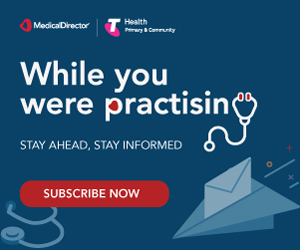Are Australians addicted to Doctor Google?
Digital innovation, mobile devices, and the Internet are making it very easy for us to look up medical information fast. MedicalDirector’s recent report, Dr Google, How Self-Diagnosis Impacts Clinical Care, reveals how Australians are now starting to form a ‘habit’ of searching Google for answers before – or instead of – seeking professional medical advice.
Surveying over 1,500 Australians, MedicalDirector’s research has revealed 54% of us habitually turn to Doctor Google at least once a week for medical questions and symptoms, even though only 21% of us perceive Google as a trustworthy source of health information.
The research, which recently gained significant media coverage, including being featured on Channel Ten, Channel Seven, Sky News, Sunrise, The Daily Telegraph and A Current Affair, reveals how this phenomenon – popularly quipped ‘Dr Google’ – is impacting the relationship between patients and their health practitioners, as well as how individuals interpret their own health.
What fuels the habit?
So why do we keep searching for answers online, even though the research suggests Doctor Google is convincing us we have an illness – when more than half the time, it turns out to be something else?
According to MedicalDirector’s CEO, Matthew Bardsley, the habit of using Doctor Google to self diagnose comes down to how we are using technology to manage ‘prediction in a fear-based health economy.’
“When we are searching for answers online, it’s often because there’s a gap in knowledge and understanding,” he says. But when we search in a state of fear about our health, we naturally look for the worst-case scenario, because we want to protect ourselves from the worst that could possibly happen.”
“So we need to be cognisant of what we are transacting in when it comes to managing health, we are transacting in ‘fear’. Search tools such as Google need to be cognizant of it too, and understand that we don’t look up health information for a ‘pleasure’ response, but because we are fearful. Because whatever information is delivered to us in that moment of fear can become what we believe.”
Let’s talk about context
It’s important to note that being proactive about one’s health and searching for answers is not a bad thing. In fact, a recent study published in the Medical Journal of Australia found consulting ‘Dr Google’ before presenting at the emergency department could improve interactions between patients and their treating physician.
However, it is the quality and scope of information that comes up in a search, and how that information is processed by a worried patient, that we need to be mindful of in the age of Doctor Google.
The report found how our current digital landscape, search engines like Google don’t contextualise the search results to give us the personalised, relevant, or deeper health information we actually need.
The problem this causes, is generating a community of ‘worried well’, simply because the information is not contextualised enough.
This is evident in the alarming finding that a majority of Australians are convinced they have had a certain illness after Googling symptoms (60%), only to find out later it was something else. Meanwhile, more than a third of Australians have become convinced they had a life-threatening or terminal illness after Googling their symptoms.
“The role of the health practitioner in optimising patient outcomes is to be mindful of how patients are interpreting Doctor Google within their fear response,” Bardsley added. “This means taking the time to clarify any information (or misinformation) the patient has sourced online, and contextualise it in relation to the patient’s individual health conditions and family history.
“Technology can and will play a key role in opening up more effective, insightful and intelligent ways health practitioners and patients gain access to the right resources and health information. Access to more contextualised health information will enable more accurate and personalised clinical outcomes, further strengthening the health practitioner/patient relationship, and improving continuity of care.”
To access MedicalDirector’s FREE report, Dr Google, How Self-Diagnosis Impacts Clinical Care, click here.









